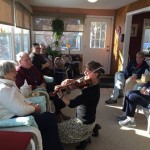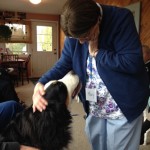Café guests in Marlborough converse in the kitchen.
Photo/submitted
By Ed Karvoski Jr., Contributing Writer
Massachusetts residents living with memory changes and their caregivers are now offered more comfortable meeting places. They’re gathering monthly at memory cafés free of charge for refreshments, activities and comradery. Cafés are currently located in Andover, Brookline, Franklin, Lexington, Marlborough, Norwood, Topsfield, Waltham and Westwood.
A network known as the Percolator shares ideas and resources with current and potential café coordinators statewide.
Tammy Pozerycki, owner and director of Pleasantries Adult Day Services in Marlborough, learned of memory cafés in 2009. At the time, the closest café to her was in Dover, N.H. After attending it, she began the Create a Better Day Café at her Marlborough facility. She has seen notable progress since then.
“It has gone from when I started with just myself and the food that I prepared – and no one else showed,” she relayed. “To now, there’s 15 to 20 guests with volunteers each month. There’s no RSVP. Someone who’s caring for a loved one with dementia doesn’t know until that exact day and time if it’s a good idea to take them to a social event. Folks with dementia have good and bad days.”
Coordinators suggest contacting them beforehand to confirm the café will be held as scheduled.
The Marlborough café typically features music and pet therapy, with optional offerings such as reiki treatment. Guests have enjoyed chili while watching broadcasts of New England Patriots games.
As part of a nationwide dementia-friendly community movement, Pozerycki is on the local advisory board for Hudson, Marlborough and Northborough. She’s working toward establishing cafés with the senior centers in those communities.
Pozerycki was contacted in early 2014 by Beth Soltzberg, program coordinator at Jewish Family and Children’s Services (JF&CS) in Waltham. Soltzberg became aware of memory cafés while researching her plan to start an arts-based program for people living with dementia and care partners.
In March 2014, the JF&CS began the state’s second memory café. Its monthly café features guest artists including art educators, dancers, musicians, poets and storytellers. Presentations are participatory, not a performance. Citing a guest of theirs from the Alzheimer’s Poetry Project, Soltzberg noted that various arts tend to prompt memories.
“Call and response poetry can elicit participation and sometimes reminiscences even from people who have advanced dementia,” she said. “Poetry, like music, has a rhythm that seems to be almost inborn. It triggers long-term memory.”
Volunteering at the JF&CS Memory Café are students of Brandeis University. Soltzberg believes the intergenerational café is a comfortable setting for all involved.
“People can come and know they’re accepted,” she said. “We live in a society where there’s still a lot of stigma about dementia. People start to stay home. There are tremendously negative health affects to social isolation. It’s not a good quality of life when you can’t go out and be with people. It’s also great to be playful and silly sometimes.”
After the JF&CS Memory Café ran for several months, Soltzberg heard from other professionals working with older adults who expressed interest in starting a café. JF&CS spearheaded the launch of the region’s Percolator network in autumn 2014.
Percolator meets quarterly at JF&CS with a presentation from a café coordinator, which gives others ideas for theirs. Networking among coordinators allows them to schedule cafés so that guests can attend more than once monthly.
“Cafés are springing up in other parts of the state,” Soltzberg said. “Just about every month, professionals come to check out our café.”
Emily Kearns, a program coordinator for the Andover Senior Center in the Center at Punchard, attended the JF&CS Memory Café and brought the idea to her community. The Andover café began in June 2015 with a grant from the Massachusetts Lifespan Respite Coalition. Other meeting locations are under consideration including area restaurants and the public library, Kearns noted.
“To create a senior-friendly community means that we have to bring our programs on the road; open it up to wider populations in more neutral and inviting venues,” she said. “Memory cafés should be an intergenerational space, so that younger caregivers can come with their loved ones, as well as older caregivers.”
Soltzberg welcomes others interested in the Percolator network to contact her at 781-693-5628 or bsoltzberg@jfcsboston.org. A directory of Massachusetts memory cafés with contact information is posted at jfcsboston.org/MemoryCafeDirectory.
Photos/submitted














